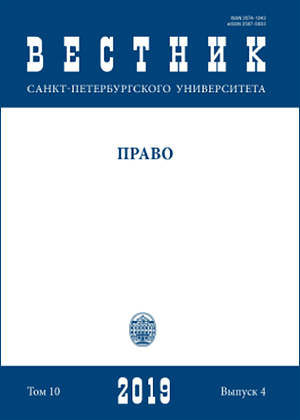Dialogue St. Petersburg — Strasbourg: on the conflict between the Constitutional Court of the Russian Federation and the European Court of Human Rights
DOI:
https://doi.org/10.21638/spbu14.2019.411Abstract
This paper reflects the authors’ opinion on the growing tension in the relationship between the Constitutional Court of the Russian Federation and the European Court of Human Rights (ECtHR). It aims at informing a broad circle of interested readers, scholars, jurists and students about the origins of the difficult relations between the Constitutional Court and ECtHR. Relations between both courts significantly soured after the Constitutional Court delivered its famous Markin judgment, ruling that under certain circumstances it may not recognize judgments from Strasbourg. This paper places this decision in the context of the manner in which international law influences the Russian legal system according to the Russian Constitution. The authors argue that it would substantially credit the Constitutional Court if it would give up on the use of the so-called ‘last word’ and, in line with other European High Courts, would engage in a constructive dialogue with Strasbourg. The paper also illustrates the tense relations between the two highest courts with references to recent judgments of the constitutional Court and places them in light of the Constitutional Court’s earlier ruling in the Bogdanov and others v. Russia case of 2001 where it loyally acknowledged that the Convention is part of Russia’s domestic legal system, accepted the jurisdiction of the Strasbourg Court and began to render its case-law enforcement practice, including judicial, in full conformity with the obligations from Russia’s participation in the Convention and the protocols thereto. Furthermore, the authors highlight the approaches of several European courts in similar situations as well as the opinions of various European and Russian lawyers on the significance of sovereignty and importance of discussion on differences that arise between the Russian Constitutional Court and ECtHR. In this respect the authors point to Protocol No. 16 of the Convention, which creates for the highest Courts of the member states of the Council of Europe the possibility to ask the Strasbourg Court for an ‘advisory opinion.’ According to the explanatory report, protocol No. 16 is meant to foster dialogue between courts and enhance the Strasbourg court’s constitutional role.
Keywords:
Constitutional Court, European Court of Human Rights, Konstantin Markin, non-enforcement judgments ECtHR, conflict, dialogue, protocol no. 16
Downloads
References
Downloads
Published
How to Cite
Issue
Section
License
Articles of "Vestnik of Saint Petersburg University. Law" are open access distributed under the terms of the License Agreement with Saint Petersburg State University, which permits to the authors unrestricted distribution and self-archiving free of charge.






